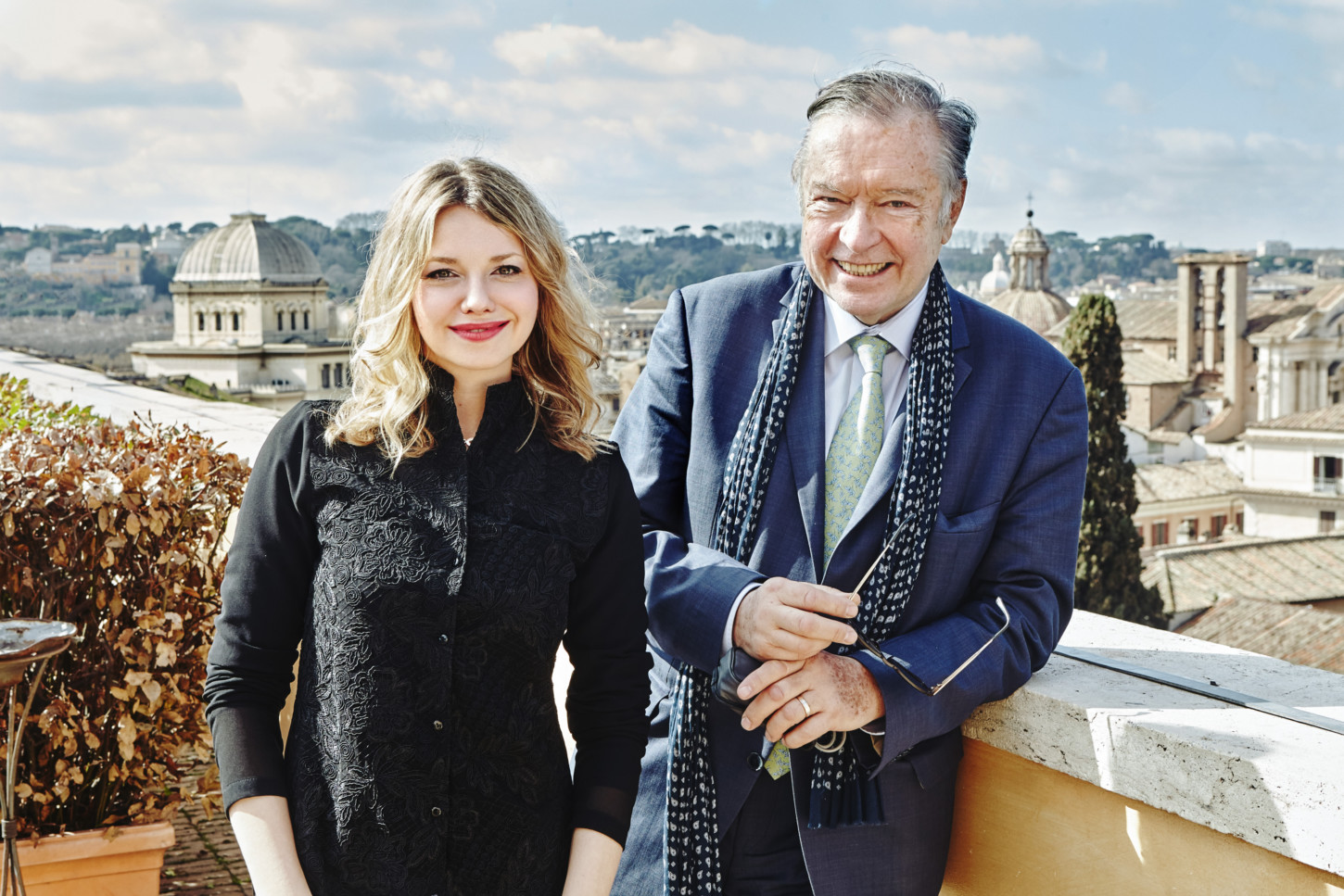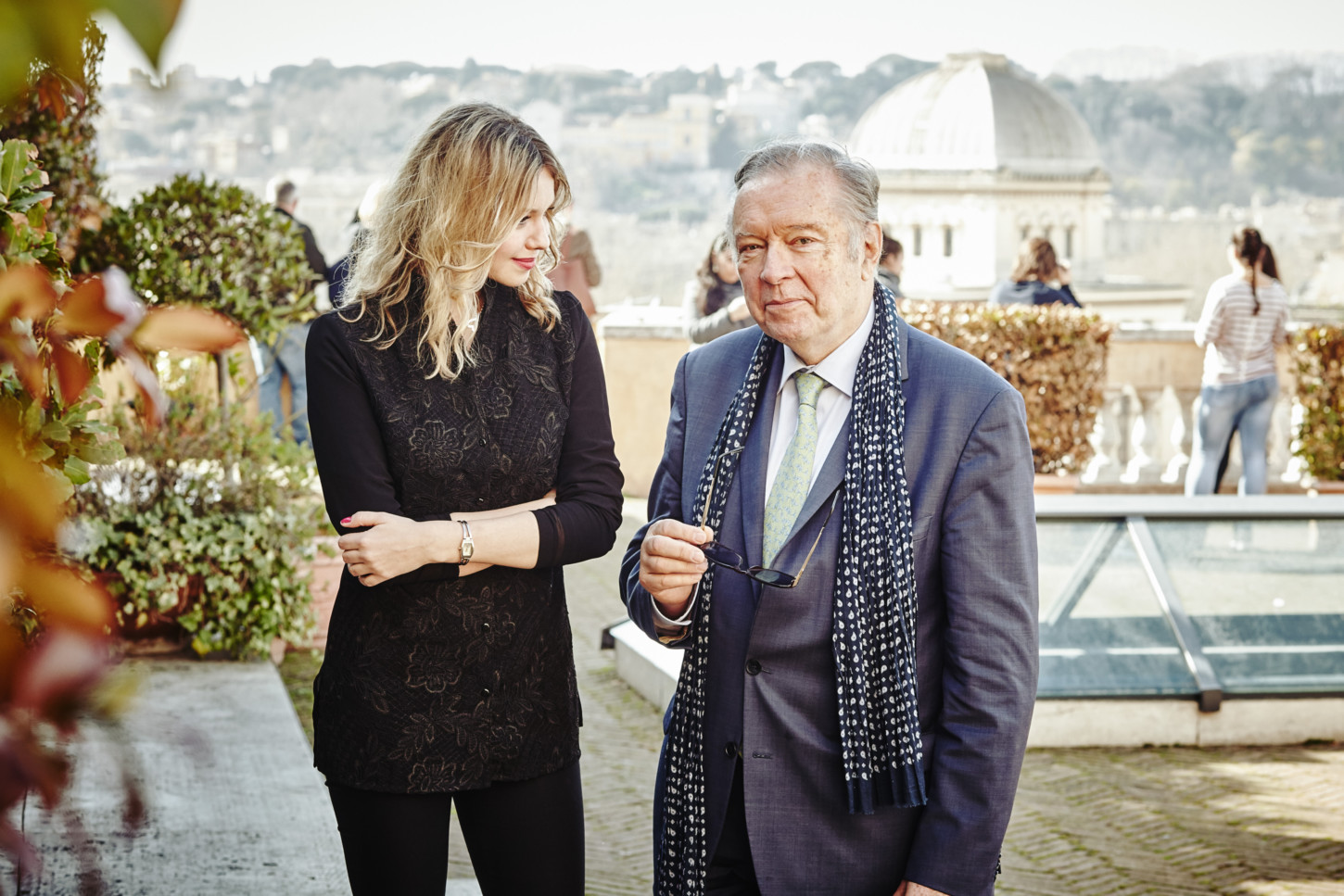POLISH CINEMA IN THE WORLD
A Conversation About Europe, Oscars, Classics and the Upcoming Movie “Ether”

He was born in 1939 in Warsaw and studied philosophy and physics at the university level before graduating from the Łόdź Film School. In his wide-ranging career has been a screenwriter, director, producer and head of the Polish film studio Tor, in addition to occasional turns as an author and stage director. Krzysztof Zanussi, we are talking about, ranks alongside worlwide famous names, such as Andrzej Wajda (Oscar for career, 2000), Roman Polański (Oscar for Pianist, 2003), Krzysztof Kieślowski (2 Oscar nominations for Red) and Agnieszka Holland (Oscar nomination for Europa Europa, 1990), as one of the major figures in post-war Polish cinema.
Fully European, Zanussi: a Pole with Italian origins who speaks 6 languages, is best known in the world of cinema for creating deeply philosophical dramas often focused on the ethical choices and metaphysical questions involved in daily life. He often treats eschatology as a main theme and he strongly denies his art is pessimistic. His important international productions are: The Constant Factor (Jury Prize, Cannes Film Festival 1980), From A Far Country: Pope John Paul II (1981), Life as a Fatal Sexually Transmitted Disease (Golden St. George Award, 22nd Moscow International Film Festival, 2000), Black Sun. Il Sole Nero (2007) and The Foreign Body (2014).
Fascinating but not surprising is that this great multilingual filmmaker opened Masterpieces of Polish Cinema by Martin Scorsese, a film season launched in 2015 at Filmhouse in Edinburgh and BFI Southbank in the UK, US and Canada. The series included his two important movies from the communist era, partially censored – Camouflage (1977) and Illumination (1975). Controversial and at the same time traditional, faithfull to the same actors and music composer (Wojciech Kilar), Zanussi for JL Interviews compares the old to the new school of Polish cinematographers, recalls the classics and announces his new Faustian cinema child, Ether.
Although you know six languages, you have Italian origins, make your movies with an international cast all the world and received numerous Polish and international awards, yet you have never settled abroad as some of your famous colleagues eg. Roman Polanski or Agnieszka Holland, even if you could have. Why?
After so many years of work I thoroughly realize, that my place is primarily in Europe, especially in Poland, dearest to my heart. I have been living here for 77 years and now, in other circumstances, I have such joy from living here. I am close to Berlin, Paris and Rome. Here my life worked out. There was a time when I was young and my distant Italian family proposed to help me and to start a career in their company, but I refused. I was aware of why I did it: to do what I do now. Today, I have no reason to regret. I have an apartment in Paris, but most of the time I live in Warsaw, because there I have more things to do.
You’re a believer, like your favorite authors Dreyer, Bergman or Bresson. In your films there is no lack of saints, spirituality and underworld. Neither there is a lack of bitter realism, tragic choices and the final question. This can be seen for example in the films “Persona non grata”, where the storyline begins with the funeral of the protagonist’s wife and ends with his own death. Similarly, in the “Black Sun”, the action begins with the tragic death of a husband, then to the failed suicide of his wife to end with a spectacular killer’s homicide. Is this pessimism? Where is this love of eschatology from?
I do not know why one should call pessimism the fact that we are mortal. I recognize this fact, and recognize this is something sad, but this is not a pessimism. We all die. Hovewer, if one proclaims the futility of the world, that can be called pessimism and certainly a great pessimist of world cinema is Woody Allen. His movies, though funny, shows futility of our existence. I prefer to look for a sense and sometimes I find it. The older I am the more I am interested in sense of our existence because it concerns me, and I want to think about it all the time, and be prepared for it. In one word, it seems to me that the other themes are a waste of time.

You are not famous for comedies except ones with black humor. One such example is the “Heart on the Palm.” The film was well received at the Film Festival in Rome in 2008, but in Poland it was criticized in connection with the guest participation of Doda, “Polish Madonna”, as you have defined her. How did the part of Dorota Rabczewska influence the artistic vision of the film? How do you define Polish society?
This is not about society, there are some coteries, somebody interpreted it providently imagining that I engaged Doda to get her audience. In this movie she was a symbol of pop culture, or low culture, she undergoes a transformation. There aren’t so many popular singers who can sing a classic opera well. She has a very nice voice, well set, she is professional. Pop culture is aesthetically distant from mine, but the clamor which was linked with the fact that she was two minutes on screen was an expression of stupidity. I am ashamed of those people who have written articles loudly condemning me. It was grotesque. Now, recently, I have shown that film in the United States, I also had the joy of being at various universities and the public caught all jokes laughing, while in Poland, many of them passed unnoticed. This is already a matter of such sensitivity, such skewed optics. We’re a somewhat bitter society, but this is the smallness over which I grieve, because I like Poland’s largess and not the smallness.
Yet I would like to return to the topic of Italian cinema, to the big names of neorealism. In one of your interviews you strongly criticized the cinema of Bernardo Bertolucci, but expressed favourably about Federico Fellini. Why? Have you had a chance to know these two directors personally?
Yes I met them, with Bertolucci we know each other. It was not criticism, I do not dare to express judgement about other’s films, but Bertolucci’s cinema is alien to me: it’s very bourgeois. This is a challenge when we talk about Italy, because he was seen as progressive there, I do not know why. Aesthetically I appreciate his cinema a lot but a real genius for me was Fellini. He was closer to my heart. Maybe even in contrast, I have already had a chance to talk with Federico and I laughed that I do not have colourful dreams as he did, which I envy him. He also made great dreamy visions in black and white. He was an undoubted genius. He discovered a completely new dimension of the cinema. He grew from theater, mainly from opera. He used a lot of theatrical devices in a magnificient cinematic way. What I am saying is but a representation of such proximity and my preferences. Also Ermano Olmi was always close to me in Italy. I only indicate those who are close to me and likeable. However, we, Poles, differ from the whole generation of Italian filmmakers by a social aspect. They were mostly communists, and for us, victims of communism, it was very sad that they supported repression. They were resigned to gulags and remained silent when all this evil was happening. It was for us, Polish directors, and for my whole generation, very difficult. Then their Communism become Eurocommunism and it was beginning to lose fcus, but this difference of experiences between our two countries was very profound and it still remains.
Your films, those made in your country or abroad, almost always refer to the political situation of Poland. After the last political elections, its image in the world has slightly changed, unfortunately for the worse. The Times (UK) called the present president Andrzej Duda “the champion of the poor”, the recent reforms of the righ-wing conservative government by New York Times were considered “pornographic” and the Italian Internazionale defined the new situation in Poland as “anti-democratic revolution”. With this background how do you see the future of Polish artists?
Fortunately artists are not good prophets. I don’t usurp such a role. About the situation in Poland I speak with moderation, it is disturbing, but not yet alarming. When I will have to say that it is alarming then I will have to take action. At the moment I am waiting, but I can’t say I am not worried. I am already concerned about it. I strongly believe that democracy in Poland is very deeply rooted and strong and can not be manipulated, but what this government will really do, I am still waiting. In many of their predictions there were very good intentions, what you also need to appreciate, the way they are being executed and, above all, the legal situation is not good. I’m just very alert and restless, hoping that nothing bad is starting. The newspapers, which you quoted, are greatly exaggerated, but it is possible that one day the foreign press will have to write all this about Poland. I hope it will never happen.

Some months ago I saw, “Remember”, a film by Atom Egoyan, the Armenian-Canadian director, twice Oscar nominated. That movie reminded me of your “A Year of the Quiet Sun”. Both speak about the origins and the role of memory, touching the issue of Nazism after the war. What is your attitude to history in general and the history of your life? Will you return you to the historical themes in your films?
My next film Ether, that will be its title, will be in costume, but will not say much about history. Hovewer, I had in my career a few such large projects, which, unfortunately, have all collapsed, because they were difficult. I had a film project about Jadwiga of Anjou – it was very advanced, my script was ready. I had an Italian-American project about the Swedish Queen Christina, I toiled a lot on her and I fully regret that it failed. Finally, I had a script about the last Habsburgs. All pictures had already begun and unfortunately all somewhere failed there were no more partners to finance the film. I think one can say a lot about historical films. Unfortunately the ignorance of history causes films to be made full of imaginary aspect together with some fillers, creating fables with uncertain historical costumes. This phenomenon comes from America, a country that does not have any history. 200 years is not a history. In the case of the Hobbit or The Lord of the rings we can maybe find some beauty, but I prefer serious historical films, which really say something about ourselves through the past and its costume.
What do you think about the Oscars? Would you like once to win an Oscar?
Not completely. The Oscar is a purely American prize. It rewards films that obtained a commercial success. The Academy sometimes favors more ambitious movies over others, but never something difficult thing, or niche, that will be never rewarded. I am more interested in the Cannes, Venice, Berlin or San Sebastian Festivals awards. However, the prizes are not so important, the importance is if your heart moves or not when watching a film.
How do you see today’s Polish cinema? How would you explain the fact that so-called “the third and fourth generation” of Polish directors, including you, Polański, Wajda and Kieślowski, are recognizable and awarded abroad, and practically nobody talks about a younger generation of Polish directors outside Poland? What is the reason of that?
I do not pay much attention to generations. There aren’t important generational divisions. In every generation there are as many the conformists, miscreants, plagiarists as beautiful, noble, uncompromising and inspired, everything is even in the world. None generation is different. Today’s generation certainly makes less films grown out of literature. Maybe less in general coming out of the tradition or culture. Cinema is more democratic, because democracy means the voice of the majority, the voice of the people and this is a sociological fact. Among the young, today, there are a lot of people very close to me and at the same time distant. The same was in my generation. It is important to mention the career of Paweł Pawlikowski. Previously, none of us, Poles, got Oscars, just Wajda for Lifetime Achievement and Polanski. Today Pawlikowski is the only Polish film director, who after such a long time obtained it with Ida in 2015. Nowdays, Central Europe is no more fashionable, we became like the rest of the world, but perhaps one day we will again be distinguished in something? I hope only for good, not for bad.
PHOTO GALLERY: Photo session was realized by Justyna Pawlowska on the Capitoline Hill, in Rome, in 2016


Beata Golembiowska Nawrocki
Very interesting interview and well written. Hopefully Zanussi , like a lot of Polish artists, will be more involved in protesting against the wrong actions of recent Polish government.